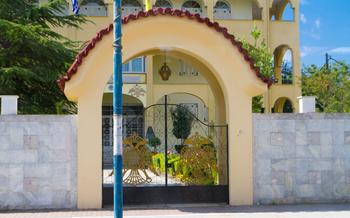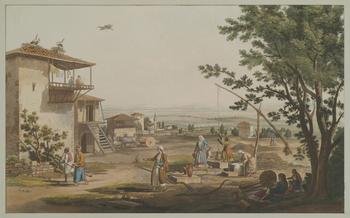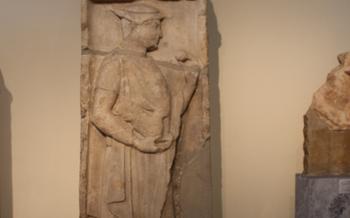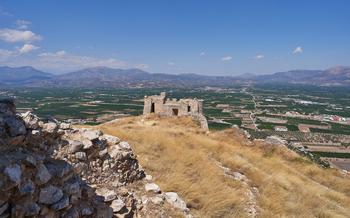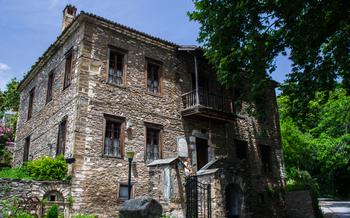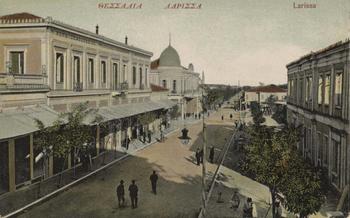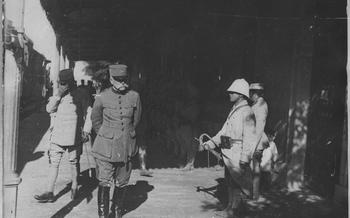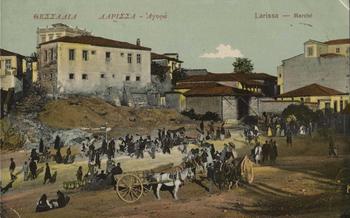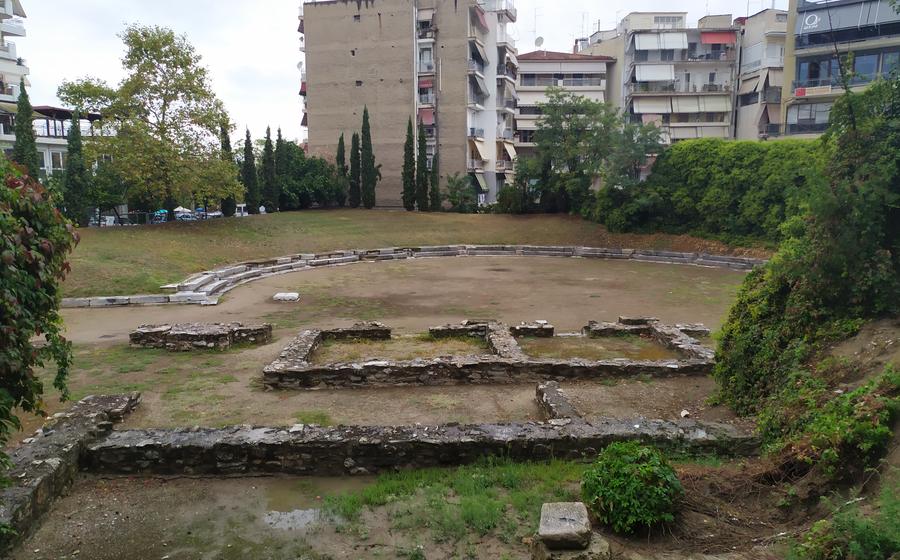
Historical Folklore Museum
- Unveiling the Historical Folklore Museum in Larissa
- A Journey Through Time: Exploring the Museum's Exhibits
- Preserving the Past: The Museum's Role in Cultural Heritage
- Traditional Craftsmanship on Display
- A Glimpse into Greek Domestic Life
- Exploring the Agricultural Heritage of Thessaly
- Interactive Displays for a Hands-On Experience
- Delving into Local History and Folklore
- Educational Programs for All Ages
- Temporary Exhibitions and Special Events
- Accessibility and Visitor Services
- Photography and Social Media
- Local Recommendations for Travelers
- Connecting with the Past Through the Historical Folklore Museum
Unveiling the Historical Folklore Museum in Larissa
Nestled in the heart of Larissa, the Historical Folklore Museum stands as a testament to the rich cultural heritage of Thessaly. Established in 1972, the museum is housed in a beautifully restored neoclassical mansion, adding to its historical charm. Its mission is to preserve, showcase, and promote the traditional crafts, customs, and way of life that have shaped the identity of this vibrant region.
Located on Romilly Street, just a short walk from the city center, the museum is easily accessible by foot or public transportation. Its central location makes it a convenient stop for visitors exploring the city's many attractions. Once inside, visitors are greeted by a treasure trove of artifacts and exhibits that bring to life the history and folklore of Larissa and the surrounding area.
A Journey Through Time: Exploring the Museum's Exhibits
The Historical Folklore Museum in Larissa takes visitors on a captivating journey through time, showcasing an impressive array of exhibits that bring to life the rich cultural heritage of Thessaly. The museum's layout is thoughtfully designed, with each section dedicated to a specific aspect of traditional Greek life.
One of the highlights of the collection is the display of folk costumes and traditional clothing. Visitors can marvel at the intricate embroidery and vibrant colors of these garments, which represent different regions and eras of Greek history. From elaborate wedding dresses to everyday attire, these costumes provide a glimpse into the diverse fashion and textile traditions of the country.
Household items and everyday objects offer another fascinating glimpse into the past. From simple cooking utensils and pottery to intricately carved furniture, these artifacts showcase the ingenuity and craftsmanship of Greek artisans. Visitors can learn about the traditional methods of food preparation, weaving, and other domestic tasks, gaining a deeper appreciation for the daily lives of people in the region.
The museum also houses a collection of farming and agricultural tools, highlighting the importance of agriculture in Thessaly's history and economy. From traditional plows and scythes to threshing machines and olive presses, these exhibits showcase the tools and techniques used by farmers to cultivate the land and produce food.
Preserving the Past: The Museum's Role in Cultural Heritage
Cultural heritage is an invaluable asset that connects us to our past, shapes our identity, and enriches our lives. The Historical Folklore Museum in Larissa plays a crucial role in preserving and promoting this heritage, ensuring that traditional crafts, customs, and stories are not lost to time.
The museum's collection serves as a repository of knowledge about Greek folklore, showcasing a diverse range of artifacts that provide insights into the lives and traditions of past generations. By preserving these items, the museum contributes to the safeguarding of Greece's rich cultural identity and ensures that future generations can appreciate and learn from the wisdom and creativity of their ancestors.
Furthermore, the museum actively promotes and educates the public about Greek folklore through exhibitions, workshops, and educational programs. These initiatives aim to raise awareness of the importance of cultural heritage and encourage people to engage with and appreciate traditional crafts, customs, and stories. By fostering a sense of pride and ownership in their cultural heritage, the museum empowers visitors to become advocates for its preservation and transmission to future generations.
Traditional Craftsmanship on Display
The Historical Folklore Museum in Larissa not only showcases the traditional way of life in Thessaly but also highlights the region's rich heritage of craftsmanship. Visitors can explore exhibits dedicated to traditional Greek crafts such as weaving, embroidery, and pottery, gaining insights into the skills and techniques that have been passed down through generations.
The museum's collection of woven textiles includes intricate rugs, blankets, and clothing, adorned with vibrant colors and traditional patterns. Visitors can admire the delicate embroidery work on garments and household items, showcasing the artistry and patience of local craftswomen. The museum also features a display of handmade pottery, with a variety of glazed and unglazed vessels, each one unique in its design and craftsmanship.
These traditional crafts held significant cultural and economic importance in Thessaly's past. Weaving, for example, was a vital part of household production, with women creating textiles for their families and for sale at local markets. Embroidery was a decorative art form, used to embellish clothing, linens, and other household items. Pottery, meanwhile, was essential for creating functional items such as cookware, storage jars, and decorative objects.
Today, traditional crafts continue to thrive in Thessaly, with artisans and workshops still practicing these ancient skills. Visitors to the museum can not only admire the exquisite craftsmanship of these objects but also learn about the history and significance of these traditional arts.
A Glimpse into Greek Domestic Life
The Historical Folklore Museum in Larissa offers a fascinating glimpse into the domestic life of Greek families in the past. Displays of traditional Greek homes and interiors transport visitors back in time, showcasing the everyday objects and furnishings that shaped the lives of generations past.
From simple wooden furniture and handwoven textiles to elaborately decorated pottery and religious icons, the museum's exhibits provide a rich insight into the material culture of Greek households. Visitors can explore the different rooms of a traditional home, including the kitchen, living room, and bedrooms, and learn about the customs and rituals associated with each space.
Household items such as cooking utensils, agricultural tools, and handcrafted furniture tell stories of the daily lives of Greek families. Visitors can admire the intricate embroidery and weaving techniques used to create traditional costumes and textiles, and learn about the significance of these items in Greek culture.
Through these exhibits, the museum offers a window into the rich domestic traditions of Greece, allowing visitors to connect with the past and gain a deeper understanding of the everyday lives of Greek people throughout history.
Exploring the Agricultural Heritage of Thessaly
The Historical Folklore Museum in Larissa not only delves into the domestic and cultural aspects of Thessaly's past but also sheds light on the region's deep-rooted agricultural heritage. Exhibits dedicated to traditional farming practices and tools provide a glimpse into the agricultural history and economy of the area. Visitors can learn about the methods and tools used by Thessalian farmers to cultivate crops and raise livestock centuries ago.
These exhibits showcase a variety of traditional agricultural implements, including plows, sickles, threshing machines, and wine presses. Visitors can gain insights into the challenges and techniques involved in farming in Thessaly's unique climate and terrain. The museum also displays traditional costumes and clothing worn by farmers, highlighting the practical and symbolic significance of these garments.
Moreover, the museum explores the connection between agriculture and the surrounding countryside. Visitors can learn about the region's unique agricultural products, such as the renowned Thessalian saffron, and the role that farming has played in shaping the cultural identity of the Thessalian people. This section of the museum provides a comprehensive overview of the agricultural heritage of Thessaly, highlighting its importance in both the history and present-day economy of the region.
Interactive Displays for a Hands-On Experience
The Historical Folklore Museum in Larissa is not just a static collection of artifacts; it also offers interactive exhibits that allow visitors to engage with the museum's collection in a hands-on way. These interactive displays are designed to make the museum experience more immersive and enjoyable, especially for younger visitors.
One of the most popular interactive exhibits is a replica of a traditional Greek kitchen. Visitors can open the cupboards, drawers, and cabinets to explore the various household items and utensils that were used in the past. They can also try their hand at traditional cooking techniques, such as making bread in a wood-fired oven.
Another interactive exhibit allows visitors to experience the process of weaving. They can sit at a loom and try their hand at creating a traditional Greek textile. There are also demonstrations of traditional embroidery and pottery, where visitors can learn about these crafts and even try their own hand at creating something.
The museum also offers a variety of workshops and demonstrations throughout the year. These workshops are led by local artisans who share their knowledge and skills with visitors. Visitors can learn how to weave, embroider, make pottery, or even play traditional Greek instruments.
These interactive exhibits and workshops make the Historical Folklore Museum in Larissa a great place for visitors of all ages to learn about Greek folklore and culture in a fun and engaging way.
Delving into Local History and Folklore
The Historical Folklore Museum not only showcases the material culture of Thessaly but also delves into the rich history and folklore of the region. Through engaging exhibits, visitors can explore the captivating stories, legends, and customs that have shaped the cultural identity of Larissa and its surrounding area.
One of the highlights of the museum is its collection of traditional folk tales and legends. These stories, passed down through generations, offer a glimpse into the vibrant oral tradition of Thessaly. Visitors can learn about mythical creatures, brave heroes, and enchanting love stories that have captivated the hearts and imaginations of locals for centuries.
In addition to folk tales, the museum also showcases exhibits on local customs and traditions. From traditional festivals and celebrations to unique marriage rituals and religious practices, visitors can gain insights into the diverse cultural expressions of the Thessalian people. These exhibits provide a deeper understanding of the region's social and cultural fabric, highlighting the continuity and evolution of traditions over time.
By exploring the history and folklore of Thessaly, the Historical Folklore Museum offers visitors a chance to connect with the local community on a deeper level. It is a place where the past comes alive, inviting visitors to immerse themselves in the vibrant cultural heritage of this fascinating region.
Educational Programs for All Ages
The Historical Folklore Museum in Larissa offers a range of educational programs and activities designed to cater to visitors of all ages and interests. Guided tours are available for school groups and families, providing an engaging and informative experience tailored to different age levels. The museum's knowledgeable guides bring the exhibits to life, sharing stories and insights that make history and culture come alive.
In addition to guided tours, the museum organizes workshops and activities specifically designed to engage children and families. These hands-on activities allow children to learn about Greek folklore through interactive experiences, such as traditional crafts, storytelling, and games. The museum also provides resources for researchers and scholars interested in local history and culture, including access to its extensive collection of artifacts and documents.
Temporary Exhibitions and Special Events
In addition to its permanent collection, the Historical Folklore Museum in Larissa regularly hosts temporary exhibitions on various aspects of Greek folklore. These exhibitions often focus on specific regions, traditions, or crafts, providing visitors with a deeper dive into the rich cultural heritage of Greece.
Throughout the year, the museum also organizes special events, workshops, and performances that bring Greek culture to life. These events may include traditional dance performances, cooking demonstrations, and storytelling sessions, offering visitors a chance to engage with local artisans, learn new skills, and experience Greek customs firsthand.
By attending temporary exhibitions and special events at the Historical Folklore Museum, visitors can gain a more dynamic and immersive understanding of Greek folklore and traditions. These events provide a platform for cultural exchange, allowing visitors to connect with the local community and appreciate the diversity and richness of Greek culture.
Accessibility and Visitor Services
The Historical Folklore Museum in Larissa is committed to providing a welcoming and accessible experience for all visitors. The museum is open to the public from Tuesday to Sunday, with extended hours during the summer months. Admission fees are affordable, and guided tours are available in multiple languages upon request. Visitors with disabilities are given priority access and assistance, and the museum is equipped with ramps, elevators, and accessible restrooms.
In addition, the museum offers a range of facilities to enhance the visitor experience. A well-stocked museum shop sells a variety of souvenirs, including books, postcards, and traditional handicrafts. There is also a charming café where visitors can relax and enjoy a cup of coffee or a light snack while taking in the museum's ambiance. The café offers indoor and outdoor seating, providing a pleasant space to unwind and reflect on the museum's exhibits.
Photography and Social Media
The Historical Folklore Museum encourages visitors to document their experiences through photography and share them on social media. Responsible use of cameras and phones is allowed in most areas of the museum, with the exception of certain delicate or sensitive exhibits. Visitors are kindly requested to respect the privacy of other visitors and avoid using flash photography.
By sharing your photos and experiences online, you can help promote the museum and its mission to preserve and celebrate Greek cultural heritage. Use the hashtag #HistoricalFolkloreMuseumLarissa to connect with other visitors and share your unique perspective. Your posts can inspire others to visit the museum and learn more about the rich traditions of Thessaly and Greece.
In addition to taking your own photos, you can also explore the museum's official social media accounts for a behind-the-scenes look at the collection, upcoming exhibitions, and special events. The museum regularly posts educational content, videos, and interactive quizzes to engage with its online audience. By following the museum on social media, you can stay up-to-date on the latest news and activities, and join a community of like-minded individuals who are passionate about Greek folklore.
Local Recommendations for Travelers
For those seeking a truly immersive experience, Larissa offers a range of accommodation options, from charming guesthouses to modern hotels, allowing visitors to soak in the city's ambiance. When it comes to dining, indulge in traditional Greek cuisine at local tavernas, savoring mouthwatering dishes prepared with fresh, local ingredients.
Venture beyond the museum to discover Larissa's other cultural gems. Visit the ancient city of Mycenae, a UNESCO World Heritage Site, and marvel at its impressive fortifications and the iconic Lion Gate. Explore the Old Town of Larissa, a labyrinth of narrow streets and historic buildings, and immerse yourself in its vibrant atmosphere.
To further delve into the region's rich cultural heritage, plan day trips to nearby attractions. The picturesque village of Meteora, with its awe-inspiring clifftop monasteries, is a must-visit. For nature enthusiasts, the lush landscapes of Mount Olympus, the mythical home of the Greek gods, offer breathtaking hiking trails and panoramic views.
Larissa hosts a variety of festivals and events throughout the year, providing a glimpse into the city's vibrant cultural scene. Join the lively celebrations of the Larissa Carnival, witness traditional dance performances at the Thessaly International Folklore Festival, or experience the flavors of local cuisine at the Thessaly Food Festival.
Embrace the opportunity to connect with the locals, learn about their customs, and immerse yourself in the authentic spirit of Larissa. Whether you're exploring the city's historical sites, indulging in culinary delights, or participating in cultural events, Larissa promises an unforgettable travel experience.
Connecting with the Past Through the Historical Folklore Museum
The Historical Folklore Museum in Larissa stands as a testament to the enduring spirit of Greek culture and traditions. By shedding light on the past, the museum provides a unique opportunity for visitors to connect with their roots and gain a deeper understanding of the rich tapestry of Greek heritage. Through its immersive exhibits and interactive displays, the museum invites visitors to explore the diverse facets of Greek folklore, from traditional crafts and customs to local history and legends.
The museum serves as a bridge between the past and the present, offering a glimpse into the lives of those who came before us. It is a place where visitors can discover the stories and traditions that have shaped the cultural identity of the region, fostering a sense of connection and belonging. Whether you are a history buff, a culture enthusiast, or simply someone who appreciates the beauty of tradition, the Historical Folklore Museum in Larissa promises an enriching and unforgettable experience.
